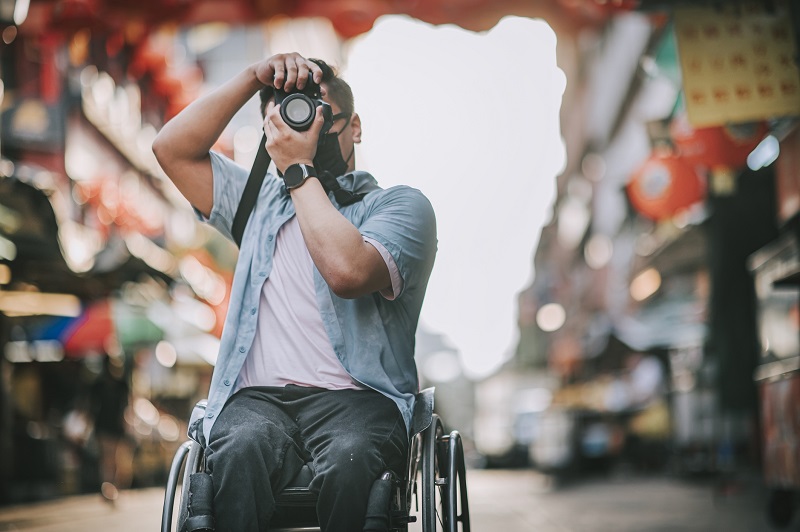Traveling with a Disability

If you have a disability and are considering international travel, a little advance planning can help you to see the world and return home safe and healthy.
Make an appointment with your healthcare provider or a travel health specialist that takes place at least 4-6 weeks before you leave. They can help you get destination-specific vaccines, medicines, and information. Discussing your health concerns, itinerary, and planned activities with your provider allows them to give more specific advice and recommendations.
Make sure to bring a copy of your official immunization records with you when you travel.
Get travel insurance. Find out if your health insurance covers medical care abroad. Travelers are usually responsible for paying hospital and other medical expenses out of pocket at most destinations. Make sure you have a plan to get care overseas, in case you need it. Consider buying additional insurance that covers health care and emergency evacuation, especially if you will be traveling to remote areas.
Enroll with the Department of State’s Smart Traveler Enrollment Program (STEP). Check for and monitor any travel advisories for your destination. Enrolling also ensures that the US Department of State knows where you are if you have serious legal, medical, or financial difficulties while traveling. In the event of an emergency at home, STEP can also help friends and family contact you.
Prepare a travel health kit with items you may need, especially those items that may be difficult to find at your destination. Include your prescriptions and over-the-counter medicines in your travel health kit and take enough to last your entire trip, plus extra in case of travel delays. Depending on your destination you may also want to pack a mask, insect repellent, sunscreen (SPF 15 or higher), aloe, alcohol-based hand sanitizer, water disinfection tablets, and your health insurance card.
Carry your medical alert information and a letter from your health care professional describing any medical conditions, medications, and potential complications.
Research the availability of wheelchairs and other medical equipment. Consider renting a wheelchair and any medical equipment at your destination. Websites such as Mobility International USA and the European Network for Accessible Tourism provide information on overseas medical equipment providers.
Considerations for Air Travel
U.S. airlines and flights to or from the United States on a foreign carrier must provide all travelers with the same travel opportunities, regardless of disability, unless doing so would endanger the health or safety of other passengers and crew.
Some airlines may require up to 48 hours advance notice and 1-hour advance check-in for certain accommodations. Check with your airline for more information. Airlines are required to provide people with disabilities access to the aircraft, an aisle seat, and a seat with a removable armrest.
If you plan to fly within a foreign country or between countries while abroad, the regulations above might not apply. Check with the airline to find out what accommodations it makes for people with disabilities.
The U.S. Department of Transportation has a toll-free hotline, 800-778-4838 (voice) or 800-455-9880 (TTY), for more information about the rights of air travelers with disabilities. Also, check federal relay 711 or the Transportation Security Administration’s website for answers to questions about screening policies, procedures, and checkpoints. Find out if there are specific policies for devices such as wheelchairs, portable machines, batteries, respirators, and oxygen.
Considerations for Cruise Ship Travel
Most cruise ships can accommodate travelers with disabilities. Check with the cruise line before booking to make sure any accommodations you’ll need are available, such as medical oxygen or a wheelchair. Some cruises cater to travelers with special needs, such as patients on dialysis.
Traveling with Service Animals
Most airlines allow a trained service animal to accompany a qualified individual with a disability. Be sure to check with your airline to ensure that your service animal meets the airline’s requirements, including necessary documentation. Service animals may not be allowed to enter all countries and are subject to animal importation regulations, such as quarantine regulations. Your service animal will also be subject to US animal import regulations when flying to the United States. Prior to traveling with your service animal, find out what documents and testing may be required to enter another country and return to the United States.
- Contact the US embassy or consulate of the destination country for information on possible restrictions for service animals and any quarantine, vaccination, and documentation requirements.
- Consult a veterinarian prior to your trip and ask about tips for traveling with service animals.
- Contact destination hotels to make sure they will allow service animals.
After Travel
If you traveled and feel sick, particularly if you have a fever, talk to a healthcare provider and tell them about any areas you recently traveled to.
If you need medical care abroad, see Getting Health Care During Travel.
More Information
- CDC Yellow Book: Travelers with Disabilities
- Society for Accessible Travel and Hospitality
- Mobility International USA
- Traveling with a Disability—Aviation Consumer Protection (US Department of Transportation)
- Travelers with Disabilities and Medical Conditions (Transportation Security Administration)
- International Association for Medical Assistance for Travellers (IAMAT)
- European Network for Accessible Tourism